Exercise & The Immune System: Get Your Sexy Back
 Thursday, December 27, 2012 at 7:00PM
Thursday, December 27, 2012 at 7:00PM  Elisabeth Veltman, The Tender Foodie tagged
Elisabeth Veltman, The Tender Foodie tagged  Dr. Keri Topouzian,
Dr. Keri Topouzian,  exercise that supports immune health,
exercise that supports immune health,  is exercise good for the immune system
is exercise good for the immune system  Email Article
Email Article  Print Article in
Print Article in  Athletes,
Athletes,  Exercise
Exercise 
With food allergies, food sensitivies, celiac disease, or any other issue involving your immune system (like lyme disease, auto-immune diseases, or cancer), exercise can be a bitch. You might feel stiff, tired, or bloated. A little extra fat around the middle? Yep, that could be the sign that your bod isn't loving some food you are eating - especially gluten. Tight abs can be more difficult to achieve for folks whose intestines, where 75% of your immune system resides, are distressed. Inflammation could bring even Chuck Norris to his knees, so the first step is finding the cause and eliminating it. The second step is healing and/or suporting your gut (see WHY and one way HOW).
Exercise is also crucial for immune health, but there may be times when you need to slow down. For those warriors who are used to being physical, the act of slowing down and changing a rigourous routine can be as much of a challenge as exercising for the first time. "I USED to be able to do this, no problem. I used to kick out 5 miles, now I struggle to do one." Getting older? Maybe, maybe not. It might be time to examine your diet and adjust your exercise routine as you heal.
One thing is certain: movement is good. I asked a few experts to help us better understand how exercise affects our immunity, and which exercises best support an immune system that is stressed in some way, so you can keep your sexy, or get it back.
Why is Exercise So Important?
 Keri Topouzian, DO, FACOEP of the Center for Healthy LivingOur first expert, Keri Topouzian, DO is a physician who practices holistic and alternative medicine in Grand Rapids and Detroit. He gives us some important insight on how the body, specifically the immune system, is affected by exercise.
Keri Topouzian, DO, FACOEP of the Center for Healthy LivingOur first expert, Keri Topouzian, DO is a physician who practices holistic and alternative medicine in Grand Rapids and Detroit. He gives us some important insight on how the body, specifically the immune system, is affected by exercise.
1. Brings Oxygen and Nutrients to Cells
When we move, it improves our circulation. Circulation carries the nutrients and oxygen to our cells, the building blocks of our bodies. Oxygen nourishes, but it also can help you ward off infection since, as Dr. Topouzian puts it, "most bugs don't like oxygen".
2. Burst Training & Heavy Weights
Burst training & heavy weights can help increase that ever-important growth hormone. Growth hormone is important in four distinct ways:
- It increases the amount of natural killer cells we produce (Natural killer cells are a type of lymphocyte, a white blood cell, and a part of the innate immune system that fights infection.)
- It can help repair DNA damage
- It enhances the thymus gland (the Thymus gland is where leukocytes learn to chemically identify specific foreign invaders and where young T cells from the bone marrow move to thymus gland and mature. In other words, it's where T cells grow up and are taught what to do.)
- It helps regulate NF-κB (nuclear factor kappa-light-chain-enhancer of activated B cells) a protein complex that controls the transcription of DNA and that inhibits inflammatory responses.
3. All Exercise Can Increase Endorphins
Endorphins - our favorite feel good stuff actually enhances the immune system and makes you feel better, happier, more energized.
What if You Feel Tired After A Workout?
If your adrenal glands are stressed, according to Dr. Topouzian, you might not be making enough cortisol to sustain a workout. You should get at least 8 hours of sleep and may need nutrients like a multi-vitamin, magnesium, vitamin C, and unheated sea salt. Yes. Sea salt. If sleep isn't doing the trick, have a heart-to-heart with your doctor before you go crazy with supplementation. Dr. Topouzian says that adrenal glands can become stressed when a digestive or stomach problem is inhibiting the absorption of nutrients. A first step would be to review your medication with your doctor. Some medication, even over-the-counter pain medication that is "anti-inflammatory" can actually irritate the gut and inhibit nutrient absorption. A next step could be food allergy and sensitivity testing. Healing your gut might get you back in the gym, on the track, on the mat, or renewing your friendship with that tennis racket.
Do You Work Out When You Are Sick?
This is where you use your intuition. If you are about to get a cold, you can sometimes ward it off with a work out – and sometimes not. But if your body is under pressure (aka, you are fatigued) and /or you have the flu, it could actually increase the infection. This means rest, pure and simple. So really listen to your body, especially those important adrenal glands. If you do work out, do it at home where you won’t spread your germs, keep yourself warm, prevent yourself from getting a chill, and stop if you feel you need to stop.
What Kinds of Exercise Can Help?
 Melanie McQuowen of PeaceLab Yoga; Photo by Daniel E. Johnson of Wealthy Street Photography
Melanie McQuowen of PeaceLab Yoga; Photo by Daniel E. Johnson of Wealthy Street Photography
The first step is to choose a routine that you love and can do consistently. Working out every day, even for 10 minutes, can help. If you find you cannot sustain a long work out, even if you used to be able to, try the on / off method (i.e. do yoga for 10 minutes, then rest for 10 minutes, jump rope for a set, then rest for a set). We'll be posting articles that contain some great workouts for your body that support immune system function when you might be down, including a wrap up article in Women's Lifestyle Magazine.
Stay tuned for Demonstration articles!
Hula Hooping: Get Your Abs in Sync with the Universe (coming soon)
Yoga: Releasing the Psoas & The Spine
Yoga: The IT Band & Its Possibilities (coming soon)
Yoga: The Thyroid & The Pititary (coming soon)
Jump Rope (coming soon)
Abs on a Ball (coming soon)
Burst Training (coming soon)

